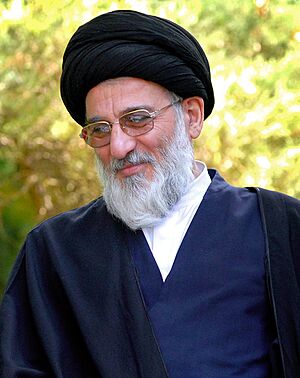Mahmoud Hashemi Shahroudi facts for kids
Quick facts for kids
Mahmoud Hashemi Shahroudi
|
|
|---|---|
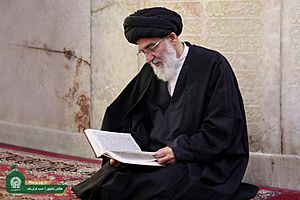 |
|
| Chairman of Expediency Discernment Council | |
| In office 14 August 2017 – 24 December 2018 |
|
| Appointed by | Ali Khamenei |
| Preceded by | Akbar Hashemi Rafsanjani |
| Succeeded by | Sadeq Larijani |
| Chairman of the Assembly of Experts Acting |
|
| In office 21 October 2014 – 10 March 2015 |
|
| Supreme Leader | Ali Khamenei |
| Preceded by | Reza Mahdavi Kani |
| Succeeded by | Mohammad Yazdi |
| Chief Justice of Iran | |
| In office 14 August 1999 – 14 August 2009 |
|
| Appointed by | Ali Khamenei |
| Preceded by | Mohammad Yazdi |
| Succeeded by | Sadeq Larijani |
| Member of Assembly of Experts | |
| In office 24 February 1999 – 24 December 2018 |
|
| Constituency | Razavi Khorasan Province |
| Majority | 1,499,109 |
| Personal details | |
| Born | 15 August 1948 Najaf, Iraq |
| Died | 24 December 2018 (aged 70) Tehran, Iran |
| Citizenship | Iranian and Iraqi |
| Political party | Society of Seminary Teachers of Qom Islamic Dawa Party |
Ayatollah Seyyed Mahmoud Hashemi Shahroudi (born August 15, 1948 – died December 24, 2018) was an important Iranian politician. He served as the Chief Justice of Iran from 1999 to 2009.
Ayatollah Shahroudi was especially known for ordering a temporary stop to stoning as a form of the death penalty.
Contents
Early Life and Education
Mahmoud Hashemi Shahroudi was born in Najaf, Iraq. His parents were of Persian background. His father, Ali Hosseini Shahroudi, was a respected scholar and teacher.
Mahmoud Shahroudi went to Alaviye school in Najaf for his early education. After that, he joined a seminary to study religious topics. He learned from famous teachers like Ayatollah Khomeini and Muhammad Baqir al-Sadr.
When he moved to Iran after the Iranian Revolution, he became a teacher in Qom. One of his students was Hassan Nasrallah, who is now a leader of the Lebanese group Hezbollah.
Political Career Highlights
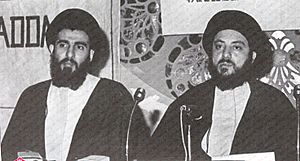
After the 1979 revolution, Shahroudi moved to Iran. He was chosen to be a member of the Guardian Council in 1995. This council checks if new laws follow Islamic rules.
In 1999, he was made the head of the Judiciary, which is the country's court system. Before him, Ayatollah Yazdi held this position.
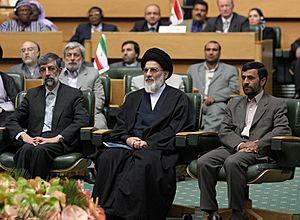
In 2001, there was a disagreement between the judiciary and the president, Mohammad Khatami. Some members of parliament were put on trial for things they said. President Khatami argued that members of parliament should be protected from trials for their speeches. Shahroudi said that judges are independent and no one, not even the judiciary chief, can tell them how to interpret laws.
Changes to Laws and Punishments
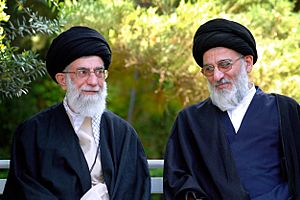
Shahroudi's time as head of the judiciary brought important changes. One big change was the "Decriminalization Bill." This bill aimed to replace prison sentences and executions with other types of punishments.
For small crimes that would usually lead to less than six months in prison, the bill suggested social penalties instead. These could include traffic, environmental, or family-related offenses. People who committed these crimes might have to attend educational workshops or skill training.
The bill also focused on crimes committed by young people.
- Children aged 7-12 would not be punished for crimes.
- For those aged 12-15 and 15-18, prison would be replaced by required training and education programs.
- For teenagers aged 15-18, execution for crimes like murder would only happen if the judge was sure they understood their actions like an adult. Also, young people with low mental development could not be sentenced to death.
This bill was approved by the parliament's judiciary committee in 2009.
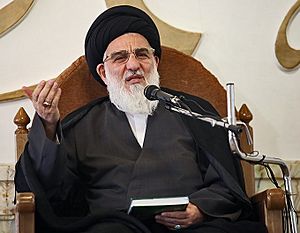
One of Shahroudi's most famous actions was putting a stop to stoning as a form of capital punishment in 2002. While the punishment was still technically allowed by law, his order meant it was not used. However, this temporary stop was overturned in 2006 and 2007.
Key Roles and Positions
Shahroudi held many important roles during his career:
- Chairman of the Expediency Council
- Member of the World Assembly of Ahl al-Bayt
- Member of the World Assembly for the Rapprochement of Islamic Religions
- Chairman and founder of the Encyclopedia of Islamic Jurisprudence on the religion of the Ahl al-Bayt
- Member and Vice President of the Assembly of Leadership Experts
- Member and Vice President of the Expediency Council
- Member of Qom Seminary Teachers Association
- Member of the jurists of the Guardian Council
- Head of the Judiciary
- Chairman of the High Board for Dispute Resolution and Regulation of the relations between the three powers
Death
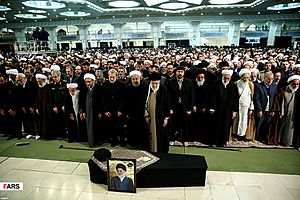
Mahmoud Hashemi Shahroudi passed away on December 24, 2018, in Tehran. He was 70 years old and had been battling cancer.
A large public funeral was held on December 26 in Tehran. He was buried at the Fatima Masumeh Mosque in Qom.
See also
 In Spanish: Hashemi Shahroudi para niños
In Spanish: Hashemi Shahroudi para niños
 | Madam C. J. Walker |
 | Janet Emerson Bashen |
 | Annie Turnbo Malone |
 | Maggie L. Walker |


